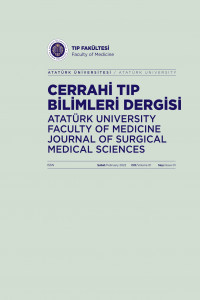AKUT PERİFERİK ARTERYEL EMBOLİ VAKALARINDA GİRİŞİM ZAMANLAMASININ MÜDAHALE SONUÇLARI ÜZERİNE ETKİSİ
Emboli, iskemi süresi, başvuru zamanı, amputasyon, mortalite.
THE EFFECT OF TIMING ON THE RESULTS OF THE INTERVENTION OF ACUTE PERIPHERAL ARTERIAL EMBOLY
Emboli, iskemi süresi, başvuru zamanı, amputasyon,
___
- Referans1. Braithwaite B.D, Davies B, Birch P.A, Heather B.P, and Earnshaw J.J. Management of acute leg ischemia in the elderly. British Journal of Surgery, 1988; 85: 217-220.
- Referans2. Haimovici H, Ascer E, Hollier L.H. Arterial embolism of the extremities and technique of embolectomy. In: H. Haimovici ed. Vasculer Surgery. Cambridge Masachusets Blackwell Science, Fourth edition, 1996; 423-444.
- Referans3. Abbott W, Maloney R, McCabe C, Lee C and Wirthlin L. Arterial embolism: A 44 year perspective, Am J Surg, 1982; 143(4): 460-464.
- Referans4. Haimovici H: Muscular, renal, and metabolic complications of acute arterial occlusions: Myonefropatic-metabolic syndrome. Surgery, 1979: 85; 461-468.
- Referans5. Patel N, Sacks D, Patel RI, et al. SCVIR reporting standards for the treatment of acute limb ischemia with use of transluminal removal of arterial thrombus. J Vasc Interv Radiol, 2001; 12: 559–570.
- Referans6. Elliot J.P,HagemanJ. H, Szilagyi D.E, Ramakrishnan V, Bravo J.J, Smith R.F. Arterial embolization: Problems of source, multiplicty, recurrence and delayed treatment. Surgery, 1980; 88: 833-845.
- Referans7. Martin P, King RB, Stephenson CB. Late embolectomy. Surg, 1969: 56; 882.
- Referans8. Mutirangura P, Ruangsetakit C, Wongwanit C, Sermsathanasawadi N, Chinsakchai K. Acute arterial embolism of the lower extremities: Impact of 24-Hour Duration on the Outcome of Management. J Med Assoc Thai, 2008; 91: 1360-1366.
- Referans9. Fecteau S, Darling RC, Roddy SP. Arterial thromboembolism. İn: Rutherford RB ed;Vascular Surgery. Philadelphia, Elsevier, 2005: 971-986.
- Referans10. Güler A, Şahin MA, Karabacak K, Küçükaslan N, Yokuşoğlu M, Tatar H. Alt ekstremite gecikmiş tromboembolik arteriyel tıkanmalarda aynı seansta embolektomi ve kapalı fasiyotomi beraberliği. Anadolu Kardiyol Derg, 2009; 9:407-410.
- Referans11. Johnson JA, Cogbill TH, Strutt PJ. Late results after femoral arter embolectomy.Surg, 1975:103; 289-293.
- Referans12. Keçeligil HT, Küsdül M, Gökgözoğlu G, Saraç A, Kolbakır F, Akar H ve ark. Akut periferik arteryel tıkanıklıklar: 179 olgunun sunumu. Türk Göğüs Kalp Damar CerDerg, 1999; 7:319-23.
- Referans13. Karapolat S, Dağ Ö, Abanoz M, Aslan M. Arterial Embolectomy: A retrospective evaluation of 730 cases over 20 years. Surg Today, 2006; 36: 416-419
- Referans14. Berqvist D, Troeng T, Elfstrom J,et al. Auditing Surgical Outcome: Ten years with The SwedishVascular Registry—Swedvasc. The Steering Committee of Swedvasc. Eur J Vasc Endovasc Surg, 1998; 164(suppl 581): 3-8.
- Referans15. Burma O, Uysal A, Akar I, Yücedağ E, Rahman A. Akut periferik arteryel tıkanıklıklarda tromboembolektomi sonuçlarını etkileyen faktörler. Türk Göğüs Kalp Damar Cer Derg, 2005; 13(4): 369-373.
- Referans16. Erentuğ V, Mansuroğlu D, Bozbuğa N, et al. Akut arteriyel tıkanıklarda cerrahi tedavi. Turkish J Thorac Cardiovasc Surg, 2003; 11: 236-239.
- Referans17. Topal AE, Eren NM, Çelik Y. Management of non-traumatic acute limb ischemia and predictors of outcome in 270 thrombembolectomy cases. Int Angiol, 2010:29(5);21-27.
- Referans18. Gülmen Ş. Akut arter tıkanıklıklarında mortaliteye eşlik eden faktörler. S.D.Ü Tıp Fak Derg, 2008: 15(2); 12-16.
- Referans19. Kempe, K., Starr, B., Stafford, J. M., Islam, A., Mooney, A., Lagergren, E., Corriere, M. A., & Edwards, M. S. (2014). Results of surgical management of acute thromboembolic lower extremity ischemia. Journal of vascular surgery, 60(3), 702–707. https://doi.org/10.1016/j.jvs.2014.03.273
- Referans20. Iyem H, Eren NM. Should embolectomy be performed in late acute lower extremity arterial occlusions. Vascular Health and Risk Management, 2009: 5; 621-626.
- Referans21. Cambrıa R, Ridge B, Brewster D. Delayed presentation and treatment of popliteal artery embolism. Ann Surg, 1991:214;50-55.
- Referans22. Shifrin EG, Anner H, Eid A, Romanof H. Practice and theory of delayed embolectomy. A 22 yer perspective. J Cardiovasc Surg, 1986: 5;553-556.
- Referans23. Taviloğlu K, Günay K, Asoğlu O, Dilege Ş, Kurtoğlu M. 10 yıllık periferik arteryel tıkanıklık olgularımızın analizi. Damar Cerrahisi Dergisi, 1995: 4; 17-21
- Başlangıç: 2022
- Yayıncı: Atatürk Üniversitesi
İmmunsüpresif olmayan hastalarda görülen ve muayene ile kolayca tanı alan ‘’Dev Molloskum’’ olguları
18-28 YAŞ ARASI POLİKİSTİK OVER SENDROMLU HASTALARDA KANDA İRİSİN SEVİYESİNİN DEĞERLENDİRİLMESİ
Hülya TOKLUCU, Paşa ULUĞ, Ümit ARSLAN NAYKI, Nesrin YILMAZ
MİTRAL KAPAK KALSİYUM DÜZEYİNİN DOKU KAREKTERİZASYON YÖNTEMİ İLE DEĞERLENDİRİLMESİ
Hasan KOCATÜRK, Hanefi Yekta GÜRLERTOP, Orhan ACAR, Munacettin CEVİZ
PRİMER HİPERPARATİROİDİZM VE İNTRATİROİDAL PARATİROİD DOKUYLA SEYREDEN MEN 2A: NADİR BİR OLGU SUNUMU
İbrahim KARABULUT, Rabia SELEN, Zehra ALTINKAYNAK, Sare ŞİPAL, Arzu BİLEN, İlyas ÇAPOĞLU, Sevilay ÖZMEN
HİDRADENİTİS SUPURATİVA HASTALARINDA FOLİK ASİT VE HBA1C DEĞERLERİNİN KORELASYONU
COVID-19 pandemisinin deri kanseri tanısına etkisi: Tek Merkezli Çalışma
Tulay ZENGİNKİNET, Zeynep Cagla OLGUN, Irem GUVENDİR BAKKALOGLU, Seyma OZKANLİ, Bengü ÇOBANOĞLU ŞİMŞEK
AKUT PERİFERİK ARTERYEL EMBOLİ VAKALARINDA GİRİŞİM ZAMANLAMASININ MÜDAHALE SONUÇLARI ÜZERİNE ETKİSİ
Eda KATIRCIOĞLU, Mihriban YALÇIN, Yahya ÜNLÜ
